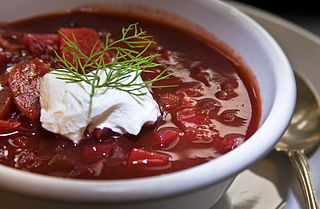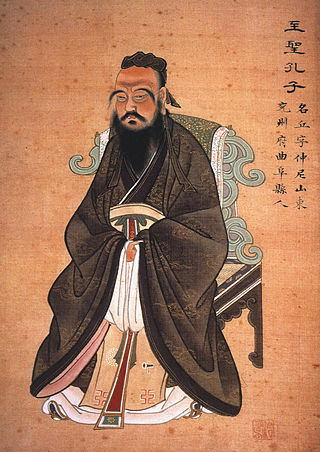
The cuisine of the Southern United States encompasses diverse food traditions of several subregions, including Tidewater, Appalachian, Lowcountry, Cajun, Creole, and Floribbean cuisine. In recent history, elements of Southern cuisine have spread to other parts the United States, influencing other types of American cuisine.
In linguistic typology, subject–verb–object (SVO) is a sentence structure where the subject comes first, the verb second, and the object third. Languages may be classified according to the dominant sequence of these elements in unmarked sentences. English is included in this group. An example is "Sam ate yogurt."

The Abkhaz alphabet is a Cyrillic alphabet used for the Abkhaz language.
The culture of Georgia has evolved over the country's long history, providing it with a unique national identity and a strong literary tradition based on the Georgian language and alphabet. This strong sense of national identity has helped to preserve Georgian distinctiveness despite repeated periods of foreign occupation.

Shashlik, or shashlick, is a dish of skewered and grilled cubes of meat, similar to or synonymous with shish kebab. It is known traditionally by various other names in Iran, the Caucasus, Eastern Europe and Central Asia, and from the 19th century became popular as shashlik across much of the Russian Empire and nowadays in the Russian Federation and former Soviet republics.

The Georgians, or Kartvelians, are a nation and indigenous Caucasian ethnic group native to Georgia and the South Caucasus. Georgian diaspora communities are also present throughout Russia, Turkey, Greece, Iran, Ukraine, United States, and European Union.

Sambar is a lentil-based vegetable stew, cooked with pigeon pea and tamarind broth. It is popular in South Indian, Sri Lankan and Maldivian cuisines. The stew has been adapted into Burmese cuisine as a popular accompaniment to Burmese curries.

Eastern European cuisine encompasses many different cultures, ethnicities, languages, and histories of Eastern Europe.

A tava(h) / tawa(h) (mainly on the Indian subcontinent), saj (in Arabic), sac (in Turkish), and other variations and combinations thereof, is a metal-made cooking utensil. The tawa is round and can be flat, but more commonly has a curved profile, and while the concave side can be used as a wok or frying pan, the convex side is used for cooking flatbreads and pancakes.

Kofta is a family of meatball or meatloaf dishes found in Balkan, Middle Eastern, North African, South Caucasian, South Asian and Central Asian cuisines. In the simplest form, koftas consist of balls of minced meat – usually beef, chicken, pork, lamb or mutton, or a mixture – mixed with spices and sometimes other ingredients. The earliest known recipes are found in early Arab cookbooks and call for ground lamb.

Lowcountry cuisine is the cooking traditionally associated with the South Carolina Lowcountry and the Georgia coast. While it shares features with Southern cooking, its geography, economics, demographics, and culture pushed its culinary identity in a different direction from regions above the Fall Line.

Ajika or adjika, is a Georgian hot, spicy, but subtly flavored dip, often used to flavor food. In 2018, the technology of ajika was inscribed on the Intangible Cultural Heritage of Georgia list.
Georgian cuisine consists of cooking traditions, techniques, and practices of Georgia. Georgian cuisine has a distinct character, while bearing some similarities with various national cuisines of the Caucasus and the wider Eastern Europe. Every region of Georgia has its own distinct style of food preparation. Eating and drinking are important parts of Georgian culture.

The following outline is provided as an overview of and topical guide to South America.
Ciulama is a dish that can be mainly found in Romanian and Moldovan cuisine. However, this dish has its origins in Turkish cuisine (çullama), otherwise related to the Romanian cuisine. It is prepared from meat or mushrooms in white sauce. The sauce is made from flour with cream.
In grammar, sentence and clause structure, commonly known as sentence composition, is the classification of sentences based on the number and kind of clauses in their syntactic structure. Such division is an element of traditional grammar.

Love Does Not Love is a 2014 Russian romantic comedy film is a relationship cheating. The film is directed by Klim Shipenko, stars Maksim Matveyev, Lyubov Aksyonova, and Svetlana Khodchenkova.

Eastern culture, also known as Eastern civilization and historically as Oriental culture, is an umbrella term for various cultural heritages of social norms, ethical values, traditional customs, belief systems, political systems, artifacts and technologies of the Eastern world.













